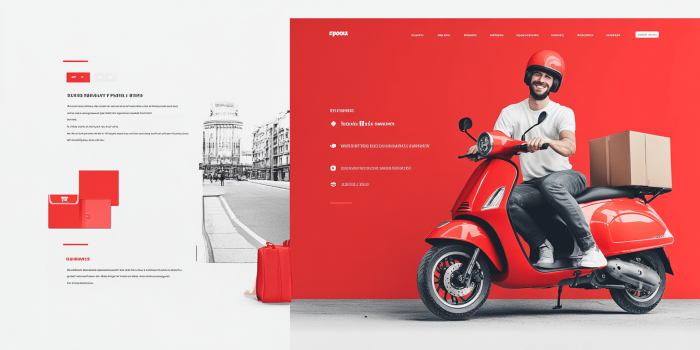A corporate website is an essential part of any modern business, taking on a wide range of tasks. It processes inquiries, transfers data, handles requests, and provides access to company services – supporting daily interaction with clients and partners. But for such a system to function reliably, it needs a stable technical environment that can handle the load while meeting modern security requirements. Hosting plays a critical role in this process – it affects loading speed, request processing, constant uptime, and the ability to quickly adjust configurations as needs grow. While there are plenty of options on the market, only those hosting solutions where the technical base, support, and service model match your actual business requirements are worth considering. Let’s take a closer look at how to choose hosting for a corporate website, what to keep in mind, and which aspects deserve the most attention.

Types of hosting and which one suits your company
Before ordering the development of a corporate website, we advise all our clients to begin by choosing a hosting option. We usually suggest several formats, each with its own characteristics and clear advantages, capable of successfully handling all core functions. These include:
- Shared hosting. Suitable for companies launching the first version of their website and not expecting heavy traffic. The site runs on a shared server, is managed via a basic control panel, and doesn’t require special skills for initial setup.
- VPS/VDS. This solution provides each client with a separate part of the server, including a dedicated IP address, guaranteed computing resources, cron support, and flexible configuration options. It works well for websites with variable load levels.
- Dedicated server. Ideal for large companies seeking full control over the system. It allows for manual configuration, custom caching, use of a personal firewall, root panel access, and compatibility with any PHP environment.
- Cloud solutions. Offer automatic optimization of resource usage and allow for easy website scaling through a management interface. You can configure database backups and enable flexible load balancing.
- Data center colocation. A relevant option for businesses that own their own equipment. The hardware is connected to high-speed networks, receives full physical protection, constant monitoring, and access to key infrastructure components.
Key criteria for choosing corporate hosting
Beyond just selecting a hosting type, several technical and functional characteristics need careful consideration. These directly influence your site’s performance, resilience, and alignment with business needs. Among them, the most important are:
| Reliability and uptime. | Hosting must ensure stable availability at all times, including peak periods when maintaining site functionality is absolutely critical. |
| Traffic bandwidth. | A site’s ability to handle growing traffic without performance drops depends on the provider’s bandwidth capabilities and the server’s geographical location. |
| Website loading speed. | This is influenced by a combination of technical factors – from SSD type and caching systems to PHP version, script configuration, and database optimization. |
| Data security system. | A good provider offers tools like SSL certificates, firewalls, antivirus protection, and regular backups to fully safeguard your site from data loss or cyberattacks. |
| CMS compatibility. | To avoid technical restrictions, make sure your plan supports the required MySQL, DNS, cron versions, and all necessary components for your chosen content management system. |
| Hosting control panel. | A modern control panel like cPanel simplifies access to settings, allowing users to manage domains and resources without technical skills while offering convenient service updates and monitoring. |

How to choose a provider and what to consider
When discussing a project or consulting on professional website development, we recommend looking beyond just the hosting format. It’s important to evaluate the provider and their service conditions. Focus particularly on:
- Customer reviews and portfolio. Studying client feedback and real cases helps assess service quality, support responsiveness, and infrastructure readiness for high-load scenarios.
- Contract terms and guarantees. A clear agreement that defines provider responsibilities and technical parameters reduces risks in cases of downtime or access loss.
- Plan details and transparent pricing. Each package should clearly list included services, resource limits, DNS settings, and IP access options, making it easy to compare plans before choosing.
- Backups and data mirroring. A reliable provider offers both automatic backups and real-time data duplication on a separate server to ensure recovery after failure without loss.
- Flexibility in switching plans. As your business grows, it’s essential to upgrade configurations quickly without launching a new contract, causing delays, or requiring technical assistance.
- Technical support availability. Equally important is how fast support responds, the convenience of communication channels, availability of online monitoring, and quick resolution of issues without needing to involve your developers.
How to test hosting before choosing
Once you’ve selected the main hosting parameters, don’t rush to pay – test the solution in practice. Even if the specs look appealing, testing will show whether the service meets expectations, how user-friendly it is, and whether it can truly handle expected loads. To do this:
- Request a trial period. This gives you a chance to see how the service performs – whether the site responds quickly, the connection remains stable, and the actual performance matches what the provider promised.
- Test the control panel in action. Even a brief interface review can show whether it’s possible to manage key settings independently, navigate easily, and carry out basic actions without technical difficulties.
- Check support responsiveness during the trial. A single inquiry during testing usually reveals how well support works and whether the provider takes responsibility in case of technical issues.
- Run a stress test on a trial site. Simulate load to see how the server performs under pressure, whether your chosen configuration can handle concurrent requests, and whether the site remains stable.
- Evaluate provider-side monitoring. A well-managed service proactively monitors critical metrics, notifies users of instability, and flags risks before they become visible.
- Clarify refund policies. If the hosting doesn’t meet your needs, you should be able to cancel without complications, financial loss, or repeated registration – especially when fast decisions are needed.
When to seek professional consultation
If your site has a non-standard structure, runs under heavy load, or integrates with third-party systems, it can be difficult to choose suitable hosting on your own. Even basic knowledge of how to build a corporate website won’t help you assess whether the server setup can handle real traffic, if the security level is sufficient, or whether the service remains stable under active use. Standard plans rarely cover project-specific nuances, and short testing provides only a surface view, failing to reveal long-term operational risks.
To avoid such issues, it’s best to seek professional advice before launching. When we discuss a project, we clarify current requirements, assess infrastructure, anticipated load, and critical support parameters. This allows us to build a precise configuration from the start – where the panel matches your CMS, load scenarios stay within safe limits, and risks of failure are minimized. As a result, activation runs smoothly, the selected plan stays relevant, and support is rarely needed.

Not sure what to look for when ordering hosting or how to choose the right CMS based on your business specifics? Then we invite you for a consultation, after which our team will suggest the best solution and seamlessly integrate it into your current processes. With our comprehensive approach, we always consider client preferences – ensuring the right result even in complex or non-standard situations. Get in touch – the QuatroIT experts are at your service!











